Natalie Bennett: From 'Jillaroo' to Green Party leader
- Published
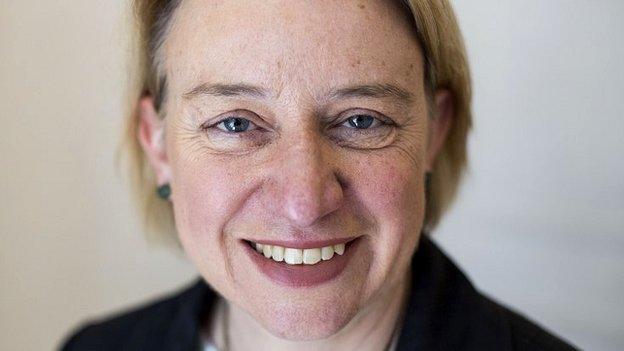
Most of us welcome New Year's Day with pledges for self-improvement. On 1 January, 2006, Natalie Bennett woke up and resolved she would take it one step further and try to "change the world".
"I had just stopped working nights and suddenly, it became possible to get on the same time schedule as everyone else," she tells the BBC.
"I thought for a while about the state of the world and that I needed to do something and decided then I'd join the Green Party."
Fast forward and here we are, chatting mid-April 2015. It is the day after the BBC party leaders' TV debate and Bennett, leader of the Green Party of England and Wales, is in a buoyant mood.
She is only the second leader of the party, which until recently shunned such a hierarchical concept, and although the Greens have only had one MP in the House of Commons, they are enjoying their highest media profile in years thanks, in part, to being invited to share a TV platform with the leaders of the main Westminster parties.
Bennett has attracted flak for her occasional media stumbles during this election campaign - she apologised to supporters for a moment of "brain fade" in an LBC radio interview, external on her housing policies - but she was deemed to have held her own in the leader debates, coming top on a measure of audience sentiment on Twitter, although snap polls of voters suggested she had made less of an impact.
Some have suggested that she is not the leader the party would want,, external with previous leader Caroline Lucas still seen as the face of the Greens to the average voter.
But there is no question that the party has seen a boost in the opinion polls with Bennett at the helm.
It has just celebrated signing up its 60,000th member, when combined with the tallies for its sister parties in Scotland and Northern Ireland, a tripling in numbers since last year, overtaking both the Liberal Democrats and UKIP.
'Unmodulated' Aussie
Not a bad fillip for an Aussie-born, political underdog who has yet to win a parliamentary seat in a campaign so close that even Britain's betting shops are having trouble setting odds.
So who is Natalie Bennett and where did she come from?
She comes across in person just as she appears on TV: no-nonsense, tough and keen to talk about the brand of radical politics, well to the left of today's Labour Party, that has been the hallmark of her leadership.
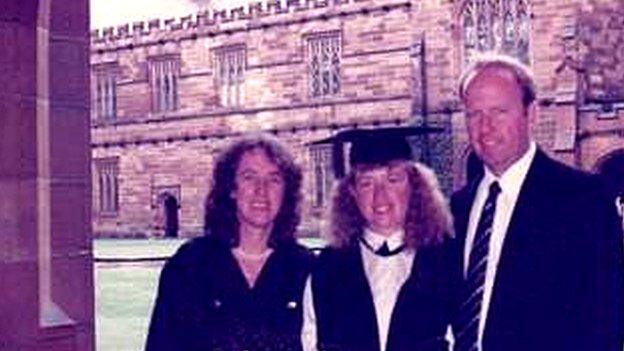
Bennett with her parents on graduation day at the University of Sydney
Her Australian accent, despite living in London for 15 years, remains unmodulated. She is palpably unsentimental about Australia, calls Britain home and even volunteers that she has allowed her Aussie passport to lapse.
Born in 1966 to teenage parents - a part-time secretary and an apprentice carpenter - Bennett was the couple's only child, growing up in Sydney's north-western suburbs.
She is keen to point out that hers was no clichéd Sydney beachside upbringing. Instead, she reminisces about the moment when, aged five, she felt the first stirrings of politicisation and feminism.
"I wasn't allowed to have a bike," she says. "My working class granny thought it unladylike, and I encountered this all through my childhood - people telling me all the things I couldn't do or that I shouldn't want to do because I was a girl."
Bright and ambitious, Bennett won a scholarship to one of Sydney's top girls' schools, MLC in Burwood, and then, a place at the city's most prestigious university, Sydney.
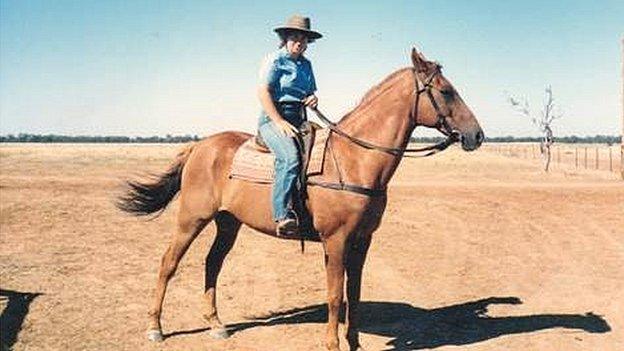
Bennett says her time 'jillarooing' was short lived because she wasn't good enough on a horse
Melanie Currey, a school friend from MLC, remembers Bennett as academic, a great debater and chess player and a girl who always did as she said: "She had her beliefs and she stuck to them," she recalls. "You'd never catch her out doing the opposite."
Bennett says her decision to study Agricultural Science at university was the result of a romantic notion of "life on the land" that developed after a childhood holiday on a farm.
"Nobody in my family had gone to university… so I had no-one to ask me: 'Is that right for you?' I decided to spend a year jillarooing [female workers employed to carry out a range of activities on a cattle or sheep station] but lasted just two months … I simply wasn't good enough on a horse or bike."
In 1989 tragedy struck when she and her parents were involved in a car crash. Bennett helped pull her father from the wreckage but her mother was killed. It is a trauma, she says, which had an indelible impact.
'No wallflower'
After graduation and a year's backpacking in Europe, Bennett turned her sights to journalism - starting on small country papers, before moving to the regional city of Tamworth and the Northern Daily Leader newspaper.

Britain's party leaders
Conservatives: David Cameron. The current prime minister is leader of the largest party (whose past leaders include Churchill and Thatcher) in the House of Common. His party formed a coalition with the Liberal Democrats and have been in power since 2010.
Labour Party: Ed Miliband. Labour leader is hoping to bring his party back into power - Tony Blair led it to victory in 1997, 2001 and 2005 but Gordon Brown led it to defeat in 2010. Polls suggest it is neck-and-neck between Conservatives and Labour.
Liberal Democrats: Nick Clegg. The Lib Dem leader took his party into government for the first time in decades in 2010 and has since seen poll ratings slump. The party is pitching its campaign on being a moderating influence on the two larger parties.
Scottish National Party: Nicola Sturgeon. Scotland's First Minister, who - despite not standing for election herself - has made much of the running in this campaign. Polls suggests the SNP is on course to take a chunk of Labour's 41 sets in Scotland.
UK Independence Party: Nigel Farage. Colourful former City trader leads UKIP, which campaigns from Britain's exit from the European Union and tighter immigration controls. It has done well in EU elections, but yet to transfer that into wins at General Elections.
Plaid Cymru: Leanne Wood. Former probation officer and leader of the party that campaigns for Welsh independence. Party won three MPs in 2010 and talks of a "progressive alliance" with the SNP, Greens and Labour at Westminster.

Tony Gillies, then the Leader's editor and now Editor-in-Chief of Australian Associated Press (AAP), remembers that in a newsroom of 25 reporters, she "was a big personality in a small room. And no wallflower".
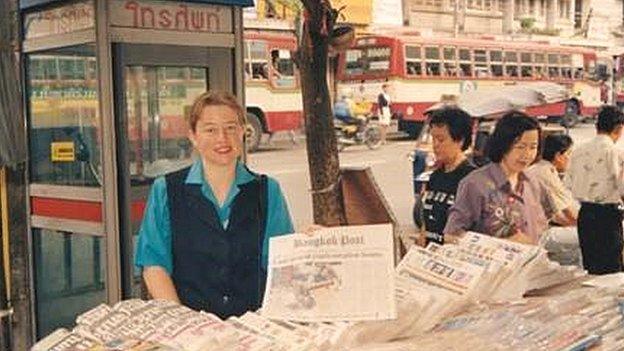
Bennett returned to journalism while volunteering in Thailand
"I saw her mostly as someone with strong values and sense of self - she liked a debate," he remembers. "Natalie had a reasonable dose of cynicism in her so she was never likely to give anyone a free kick."
Ann Newling, now the Leader's editor, was a young reporter with Bennett and remembers her as "intense". "She was interested in serious stories - and in every regional newsroom you need a reporter like that," she says.
"She was opinionated, but not gratingly so, or not too much more than any of us in those days and those newsrooms. I remember Tony Gillies described Nat as having a voice like a Gatling gun."
By 1993 Bennett had itchy feet, applied to Australian Volunteers Abroad and moved to Thailand to work on the National Commission on Women's Affairs. When the stint ended, she decided to stay-on, working back in journalism at the Bangkok Post.
Grassroots campaigner
In 1999, the call of the UK became too strong and like many Australian journalists in Fleet Street's heyday, she worked in several newsrooms including the Telegraph, Independent and Times, before shifting to the Guardian where she also edited The Guardian Weekly.
Bennett says she was always sure that the time would come when she would move away from reporting and move to "doing".
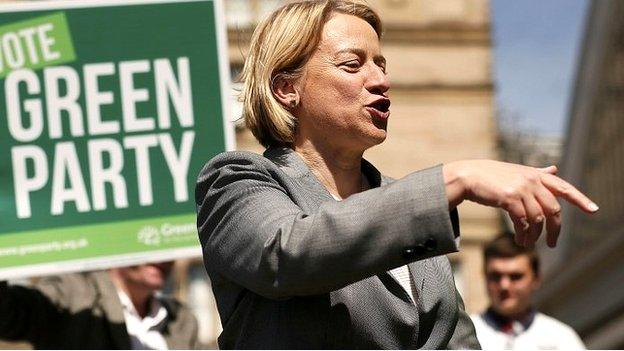
Bennett's Green Party is 'unashamedly radical'
"As a journalist, you report, see the same stories year after year: famines, conflict, disaster. I'd always imagined that the next move would be into an NGO or the UN world, but in 2006, that New Year's Day, I decided to do something."
And "do" she did. Over the next six years, she worked in her spare time for the Greens, standing (unsuccessfully) in several seats, campaigning at grassroots and as communications' coordinator for the national executive.
Finally, in 2012, just as she had taken voluntary redundancy from The Guardian and was preparing to spend a leisurely year writing a book (the working title was "How we got into this economic and environmental mess and how to get out of it"), when Green Party leader Caroline Lucas announced she wanted to hand over the leadership to someone else so she could focus on her electorate.
Bennett threw her hat in to the ring and won.
On 7 May, the ambitious Aussie with the Gatling gun voice will go to the polls urging UK voters to join her in a "peaceful political revolution", with the promise of an unashamedly radical, left wing manifesto.
Among her pledges is a plan to redistribute wealth (higher taxes for the rich, boost the minimum wage by £10), re-nationalise railways, decommission Britain's nuclear weapons and install free, nationwide home insulation for nine million "cold homes".
Richard Jones, a British-born former New South Wales MP and high-profile environmentalist, said Bennett is little known in her birthplace but her party's manifesto is "exactly the kind of radical politics we need in this country today".